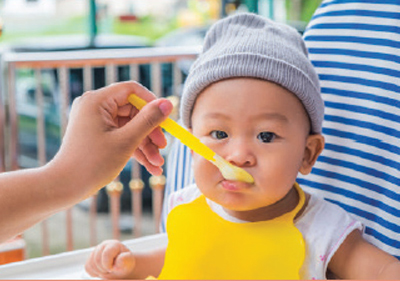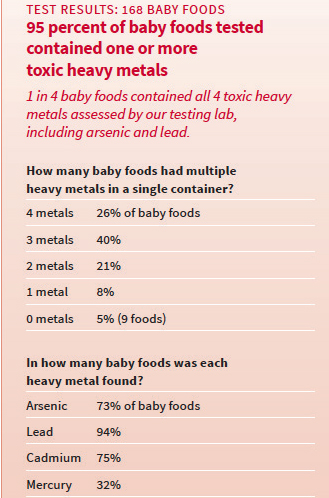New report raises concerns about contaminants in baby food
By Nisa Islam Muhammad -Staff Writer- | Last updated: Nov 1, 2019 - 9:20:49 AMWhat's your opinion on this article?
Today, as parents shop expecting high quality nutrition, convenience and safe baby food for their young children selecting from the billion dollar industry of store-bought brands, the news is not good. A national investigation found 95 percent of products tested contain toxic chemicals that lower babies’ IQ.

|
New tests of 168 baby foods commissioned by Healthy Babies Bright Futures found one in four baby foods contained all four heavy metals assessed by the testing lab—arsenic, lead, cadmium, and mercury. Even in the trace amounts found in food, these contaminants can alter the developing brain and erode a child’s IQ. The impacts add up with each meal or snack a baby eats.

|
But topping the list are rice-based foods—infant rice cereal, rice dishes and rice-based snacks. These popular baby foods are not only high in inorganic arsenic, the most toxic form of arsenic, but also are nearly always contaminated with all four toxic metals.
The new study, completed by the nationally recognized toxicology and economic research firm Abt Associates, estimates that lead and arsenic in rice-based foods account for one-fifth of the more than 11 million IQ points children lose from birth to 24 months of age from all dietary sources. This concentrated risk underscores the need for swift action from FDA and baby food companies to reduce arsenic levels in rice-based foods.
“When it comes to the first foods we feed our children, we rightfully expect those foods to be undeniably safe, nutritious, and appropriately regulated. We do not expect to learn that those first foods might come with—even a chance—of lasting consequence that could sabotage the development of newborns,” said U.S. Senator Charles Schumer (D-NY) at a press conference October 20.
“Simply put, when baby food ingredients across a variety of brands are called into question, it is the job and charge of the FDA to be the cop on the beat making sure serious questions are answered and appropriate guidelines enforced. Right now, that’s not entirely the case, and it’s a pattern that needs to change, because parents are demanding answers,” he said.
Sen. Schumer demanded the FDA investigate the report’s findings and urged the agency to propose regulations parents and others have been waiting on. He said the FDA’s inability to even comment on the new report leaves many people concerned. He urged the agency to issue a public statement regarding the findings of the report. Sen. Schumer said the medley of metals found within baby food ingredients raises serious health questions that demand clarity and long sought guidelines.
“I recently heard the news about this report and was very disgusted. Mothers should breastfeed their babies for two years. The first six months should be exclusively breast milk. After six months you can incorporate ‘baby food’ but nothing processed if possible. Given this news I would only feed my baby whole foods that I prepare myself,” said Dr. Mayyada Muhammad, a family physician. Instead of purchasing bottled processed baby foods off the shelf or baby cereal in boxes, she would make her own baby food at home, something parents should strongly consider.
“Boil, bake, or steam fresh vegetables then pulse in a blender. Mash or pulse fresh organic fruits from the farmers market. Make your own cereal using oatmeal (no honey if less than one year) or cream of wheat. Make bean soup and pulse it in the blender,” explained Dr. Muhammad. She also stated for parents that eat meat to never eat or feed processed meats (turkey sandwich/deli meat, turkey sausage, turkey bacon, chicken nuggets, hot dogs, etc.) to their babies and children.
“These meats are group one carcinogens which means they are known to cause cancer like cigarettes. In summary the best diet for our babies is one without processed food. I would recommend understanding what processed foods are and the difference between highly, moderately, and minimally processed foods!” she added.
“The more processed the food is the less health and more likely it is to be contaminated. I also recommend that vegetarians refrain from eating impossible/beyond meats because these are also highly processed and cancer causing,” said Dr. Muhammad.
According to USA Today, a few of the popular brands tested include Gerber, Up&Up, Parent’s Choice, Similac and Enfamil. Some of the types of baby food tested include infant formula, infant cereal, teething biscuits and rice puffs.
“These products were bought from 14 different metropolitan areas and 17 retailers, including supermarkets, dollar stores, baby stores and superstores. According to the report, 94 percent of the tested products contained lead, 75 percent had cadmium, 73 percent had arsenic and 32 percent had mercury,” noted usatoday.com
Healthy Babies Bright Futures recommended five healthier food substitutions that can help in reducing babies’ exposure to heavy toxic metals:
• Rather than rice snacks, parents can give their children rice-free snacks, which contain much lower levels of toxic metals.
• Parents can use organic teething foods, like frozen bananas and chilled cucumbers, instead of teething biscuits or rice tusks.
• Multi-grain cereals, like oatmeal, can also be fed to babies instead of rice cereal.
• Babies can drink water instead of fruit juice.
• Feed babies a variety of fruits and veggies instead of just carrots and sweet potatoes.
INSIDE STORIES AND REVIEWS
-
-
About Harriett ... and the Negro Hollywood Road Show
By Rabiah Muhammad, Guest Columnist » Full Story -
Skepticism greets Jay-Z, NFL talk of inspiring change
By Bryan 18X Crawford and Richard B. Muhammad The Final Call Newspaper @TheFinalCall » Full Story -
The painful problem of Black girls and suicide
By Charlene Muhammad -National Correspondent- » Full Story -
Exploitation of Innocence - Report: Perceptions, policies hurting Black girls
By Charlene Muhammad -National Correspondent- » Full Story -
Big Ballin: Big ideas fuel a father’s Big Baller Brand and brash business sense
By Bryan Crawford -Contributing Writer- » Full Story






 Click Here Stay Connected!
Click Here Stay Connected!








